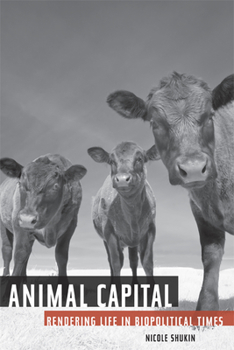Animal Capital: Rendering Life in Biopolitical Times Volume 6
Select Format
Select Condition 
Book Overview
Illuminates the profound contingency of market life on animal figures and flesh
The juxtaposition of biopolitical critique and animal studies--two subjects seldom theorized together--signals the double-edged intervention of Animal Capital. Nicole Shukin pursues a resolutely materialist engagement with the "question of the animal," challenging the philosophical idealism that has dogged the question by tracing how the politics of capital and of animal life impinge on one another in market cultures of the twentieth and early twenty-first centuries.
Shukin argues that an analysis of capital's incarnations in animal figures and flesh is pivotal to extending the examination of biopower beyond its effects on humans. "Rendering" refers simultaneously to cultural technologies and economies of mimesis and to the carnal business of boiling down and recycling animal remains. Rendering's accommodation of these discrepant logics, she contends, suggests a rubric for the critical task of tracking the biopolitical conditions and contradictions of animal capital across the spaces of culture and economy.From the animal capital of abattoirs and automobiles, films and mobile phones, to pandemic fear of species-leaping diseases such as avian influenza and mad cow, Shukin makes startling linkages between visceral and virtual currencies in animal life, illuminating entanglements of species, race, and labor in the conditions of capitalism. In reckoning with the violent histories and intensifying contradictions of animal rendering, Animal Capital raises provocative and pressing questions about the cultural politics of nature.Format:Paperback
Language:English
ISBN:0816653429
ISBN13:9780816653423
Release Date:April 2009
Publisher:University of Minnesota Press
Length:288 Pages
Weight:1.02 lbs.
Dimensions:0.9" x 6.0" x 8.9"
Customer Reviews
0 rating





